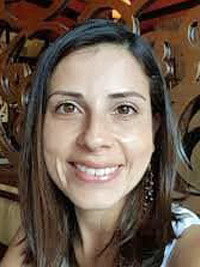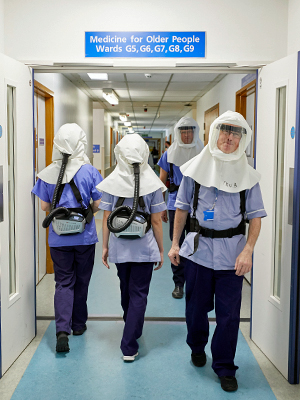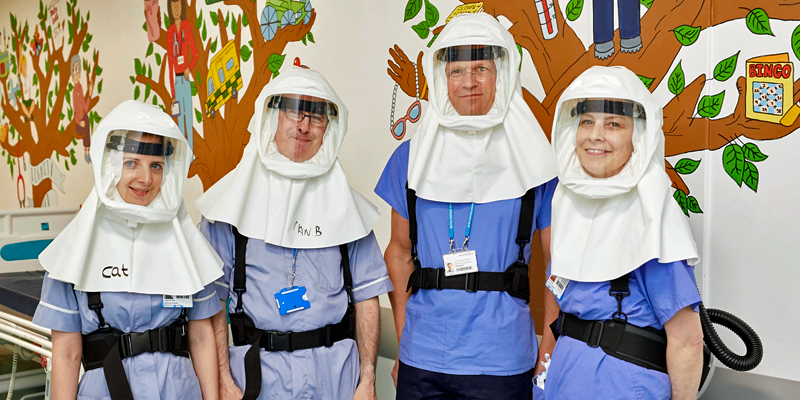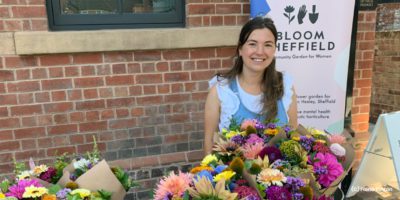Dr Diana Garay-Baquero is a researcher in the academic unit of clinical and experimental sciences at the University of Southampton. Diana is part of a small team that is currently working on a personal respirator for healthcare professionals treating COVID-19 (PeRSo). She has a PhD in biomedical science and has recently started a new postdoctoral position.

“We experienced how PeRSo helped to minimise the risk of infection of medical staff at University Hospital Southampton while treating COVID-19 patients and how it resolved some of the supply chain issues associated with disposable PPE, which is a significant challenge around the world.”
Two big passions
I have two big passions: education as a way to promote social development; and translation of scientific research to improve life quality.
I majored in chemistry and education in Colombia. During my studies, I was amazed by the diversity of mechanisms proteins use to mediate all sorts of biological functions and decided to do an MSc in biochemistry.
My project involved the analysis of the membrane proteome related to invasive phenotype in cervical cancer. This project allowed me to visit Brazil to train in mass spectrometric techniques and got me interested in pursuing a PhD.
I did my PhD in biomedical science at the University of Southampton where I focused on finding new protein biomarkers to improve active tuberculosis diagnosis.
Currently, I am a postdoctoral researcher at the University of Southampton interested in unconventional T cell responses in human tuberculosis.
Project PeRSo-DW
PeRSo-DW is a project that aims to enable local manufacture of personal respirators in the developing world.
To do so, we have made our device specification completely open, generated videos and material describing our journey with PeRSo and our current prototype and created a website to share our project allowing people around the world to openly access to this information.
My main role in the project is to support the website design, manage the communication with people interested in PeRSo-DW around the world and create networks that could potentially facilitate the local manufacture of personal respirators.
Currently, personal respirators based on the PeRSo prototype are been developed in Colombia, Bangladesh and Ethiopia. We also have a Spanish and Italian version of our website to facilitate access to the information.
Taking our prototype to the COVID-19 frontline
Our prototype consists of a fabric hood, which covers the wearer’s head, and a plastic visor to protect their face.
A small portable unit delivers clean air through a High-Efficiency Particulate Air (HEPA) filter to the wearer from a battery-powered fan pack mounted on a belt. In this way, filtered air is continuously delivered to the wearer for eight to nine hours. Additionally, our design is lightweight and quiet which makes it comfortable to use.
The main interest of all the members of the PeRSo-DW team was to take our experience developing a personal respirator to support the NHS frontline fight against COVID-19 in a timely manner and make it available to local manufacturers around the world.

However, we are aware that the availability of many of the components required for PeRSo is limited or inexistent in many parts of the world, hence we are currently working on prototypes built with everyday materials that could be relevant to these conditions.
Current projects
At the moment we are actively working on producing prototypes conducive to poor-resource settings, easy to build with everyday materials that can be locally produced and tested for safety.
I am currently also working on a very exciting project focused on understanding unconventional T cell responses in human tuberculosis. This project could help us to uncover novel immune mechanisms in tuberculosis, which could inform the future development of vaccines.
I am very grateful to be part of PeRSo-DW, a team continuously working to support frontline medical staff fight against COVID-19 around the world, and I hope we can keep building a community of practice around personal respirators that can better protect healthcare and key workers.
In addition, I am working towards a strong research collaboration between Colombia institutes and the University of Southampton to study infectious diseases using new technologies.
I strongly believe that collaboration across disciplines and research groups is key to keep advancing knowledge and innovative solutions to face global healthcare challenges.
https://www.southampton.ac.uk/
https://www.southampton.ac.uk/publicpolicy/support-for-policymakers/policy-projects/perso-dw.page





